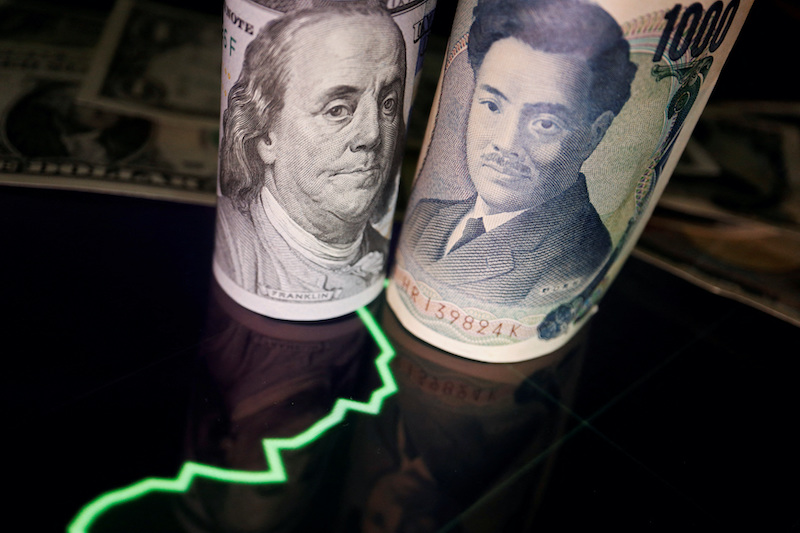The yen jumped to a seven-month high on Friday and Asian stocks also rose, with investors happy about a slowdown in US inflation data on Thursday.
Japanese bond yields broke above the Bank of Japan’s target as markets challenged Tokyo’s commitment to loose monetary policy.
MSCI’s broadest index of Asia-Pacific shares outside Japan rose 0.8% to hit a new seven-month high and were headed for a third consecutive week of gains.
Japan’s Nikkei fell 0.4% and the yen, which surged 2.7% against the dollar overnight, kept going and rose about 0.2% further to 128.65 per dollar. It is up 6% in little more than three weeks since the Bank of Japan stunned markets by widening the band around its 10-year bond yield target.
ALSO SEE:
Thais Nab $50m off Myanmar Crony, Avoid Army Chief’s Assets
Bets on BOJ policy change
A newspaper report flagging the possibility of more flexibility has redoubled bets on a coming shift out of ultra-easy policy that seeks to pin yields near zero.
The yield on 10-year Japanese government bonds breached its new cap of 0.5% on Friday morning trade at 0.53%. The BOJ was making unscheduled bond purchases in response.
“The market is expecting at the next meeting that they will increase the band for the 10-year again,” said Naka Matsuzawa, chief Japan macro strategist at Nomura, referring to the central bank’s upcoming meeting running 17-18 January.
“I think it’s too early for the BOJ to give up,” he added. “It still has ammunition to defend the 0.5% yield cap.”
The BOJ had described its December move as aimed at addressing distortions in the bond market, and defended the new target with bond purchases – but that is under immense pressure now as traders have a sniff of a shift at next weeks’ meeting.
“No change in policy this month would be a setback for the yen,” said Rabobank FX strategist Jane Foley. “However, we would look to buy the yen against the dollar on dips on anticipation of another (policy) move … in the spring.”
The BOJ will likely raise its inflation forecasts next week and debate whether further steps are needed, sources familiar with the bank’s thinking said.
US CPI slows to 6.5%
Beyond Japan, market sentiment was dominated by overnight US December inflation data that landed more or less on consensus expectations. The annual pace of headline consumer price rises slowed to 6.5% in December from 7.1% in November.
Investors responded by down-shifting expectations for US interest rates. A Federal Reserve hike of 25 basis points rather than 50 next month is now nearly universally expected, and futures markets have priced in several rate cuts this year.
The dollar slipped broadly, US treasuries rallied and assets seen as risky, such as stocks and cryptocurrencies, rose.
The Nasdaq hit a one-month high. The US dollar dropped 0.9% to a nine-month low of $1.0868 per euro and the risk-sensitive Australian dollar rose to a roughly five-month high at $0.6984.
Bitcoin surged 5% to break above $19,000. But some analysts struck a note of caution since services inflation remains sticky and because Fed policymakers are talking only of a slowdown in hikes in the offing, not a pivot to cuts.
“Market relief is grounded on solidifying evidence of dis-inflation squaring with the Fed approaching the end of its tightening cycle,” said Vishnu Varathan, head of economics at Mizuho Bank in Singapore.
“But the layers of inflation suggest that markets may be overly optimistic about ‘pivot’.”
Oil extended gains overnight – helped, too, by optimism about China’s reopening – and Brent crude futures were broadly steady at $83.82 in Asia morning trade.
South Korea’s central bank raised its policy interest rate by 25 basis points on Friday, as expected, and economists now think it might have reached the end of its hiking cycle.
- Reuters with additional editing by Jim Pollard
ALSO SEE:
Asia Stocks Flat as Edgy Investors Wait on US Inflation Data
Yen Dives to 32-Year Low as Relentless Dollar Powers On
























